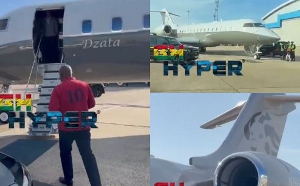With much funfair, the government last week launched what is called Ghana?s 2057 budget or 50-year budget. We are told the budget seeks to define the road map for real economic growth for the next 50 years.
Vice President Aliu Mahama who launched the document was optimistic that in 50 years, Ghana expects fair trade from the International Community, an Inter-modern transport project, including tunnels from Dodowa to Kwamoso and Nkawkaw to Abene, a thriving agro industrial complex and the skilled gender balanced population.
He said with careful management, the resources to invest will be available, adding that, the Bui Dam, discoveries of oil and other improvement in the energy sector would offer exciting possibilities
Vice President Mahama said government had insulated the economy from so-called external shocks to the point where inflation, interest rates and exchange rate are stable enough for the private sector to be able to predict and plan with certainty.
Quite expectedl y, Mr. Kwadwo Baah-Wiredu, Minister of Finance and Economic Planning said since 2000, government had pursued an economic strategy that focused on macro-economic stability and poverty reduction.
Interestingly, Mr Joseph Henry Mensah, Chairman of the National Development Planning Commission said Ghana?s relations with the Bretton Wood Institutions had not yielded the necessary fruits; hence the need for the nation to redefine her development perspective and policies.
That Mr. Mensah was candid enough to admit that Ghana?s relationship with the Bretton Woods Institutions for the past 50 years had not yielded the need results points to a more pressing need for our economic managers to tailor our economic policies to the peculiar needs of Ghanaians and not always tied to the apron strings of our western donors. Allied to this is the EPAs which the European Union desperately wants African countries to sign by December ending or risk non-preferential trade status (if there is any) with the EU. Our government must factor the impact of our western partners into our long term development agenda vis-a-vis EU?s policies like the EPAs.
Has this 50-year development plan made room for bridging the gap between the weakened economies of the north in particular with the more buoyant economies of the south, so as not to perpetuate the current disproportionate linkages between the north-south economies? Anything short of this will amount to planning to fail. Currently, there is not a single vibrant state-owned industry in the whole of the north. Nor have there been successful attempts at resuscitating the moribund state enterprises in that part of the country.
But one question remains, and that is whether the 50-year budget can stand the test of time. This fear is hinged on the fact that the Seven-year Development Plan of Dr. Kwame Nkrumah, the Seven-year Development Plan of Dr. Busia and the five-year development plan of Acheampong ended with the change of government. Even the much publicized Ghana Vision 2020 put together by the NDC government was put aside when the NPP assumed office in 2001. In its place is the Vision 2015 put together by the current government.
The second question is whether the 2057 Budget will replace the 2015 vision of the NPP or the two will be implemented concurrently. Either way how acceptable will 2057 budget be to a new government? The budget should be such that it can be implemented as a national policy, not a party policy, so that any government coming into office will see the need to continue implementing it to achieve the targets of $60,000 per capita, two percent inflation etc.
Editorial News of Saturday, 29 September 2007
Source: Public Agenda












